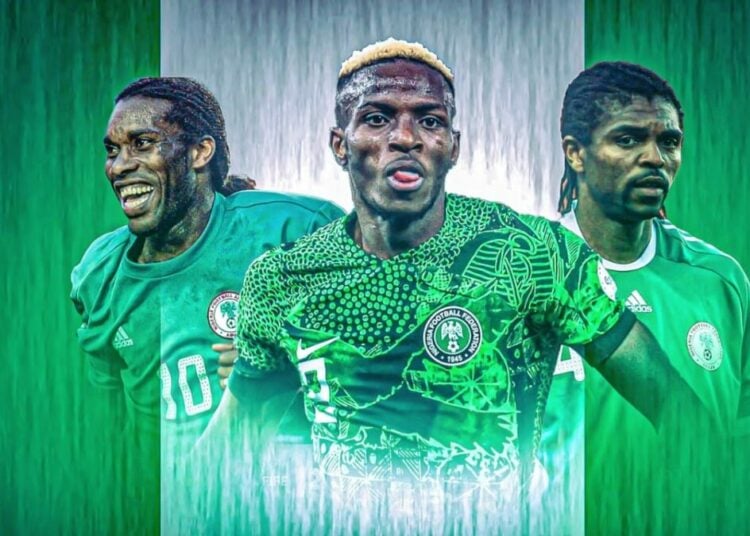Football is more than a sport in Nigeria — it’s a national identity, a heartbeat that unites people from Lagos to Kano, from Port Harcourt to Kaduna. For decades, the green and white jersey of the Super Eagles has symbolized pride, resilience, and unity. Yet, beyond the cheers and the emotional highs, Nigerian football is undergoing a profound transformation.
From the dusty pitches of local communities to glittering stadiums abroad, Nigeria’s football ecosystem is expanding — technologically, economically, and culturally. The country’s journey from grassroots talent to global recognition reflects not just athletic excellence but also the spirit of innovation shaping Africa’s sporting future.
From Street Games to Structured Leagues
For many Nigerians, football begins not in academies but on the streets. It’s where creativity meets chaos, where raw skill is born. Those informal games have produced some of the world’s most gifted players — from Jay-Jay Okocha’s artistry to Kanu Nwankwo’s vision and Victor Osimhen’s determination.
However, in the last decade, Nigerian football has evolved from spontaneous street matches into an organized system driven by professional clubs, youth academies, and private investment. The Nigeria Professional Football League (NPFL) has made strides toward better governance, improved player welfare, and increased visibility through digital coverage.
Fans can now follow NPFL games in real time through live-score platforms like Nowgoal.ink, which bring instant updates, match statistics, and league standings from both local and international competitions. Such digital tools have bridged the gap between local passion and global access, giving Nigerian fans and scouts around the world a front-row seat to the country’s football evolution.
The Digital Transformation of Nigerian Football
The integration of technology has changed everything about how football is played, watched, and monetized in Nigeria. Years ago, fans depended on radio commentaries and next-day newspaper reports. Today, they get live notifications, analytics, and player performance data directly on their smartphones.
The rise of mobile internet across Africa — and Nigeria in particular — has fueled this revolution. Streaming platforms now broadcast NPFL and CAF matches online, allowing millions to follow local heroes from anywhere. Clubs are investing in social media teams and digital marketing strategies, understanding that online visibility directly attracts sponsors and fans.
At the same time, data analysis is finding its way into training grounds. Nigerian coaches increasingly rely on performance analytics to track player movement, speed, and stamina, aligning local methods with global standards. Technology isn’t just a convenience; it’s redefining football development in the country.
The Global Impact of Nigerian Talent
Nigerian players are among Africa’s most successful exports. From Europe to Asia, they continue to make headlines — not only for their athleticism but for their professionalism and adaptability. Players like Victor Osimhen (Napoli), Ademola Lookman (Atalanta), and Samuel Chukwueze (AC Milan) are ambassadors of the new Nigerian football identity: modern, disciplined, and globally competitive.
Their success stories have inspired countless young players back home. Unlike before, where visibility was limited, scouts now use online databases, video highlights, and live-score platforms to discover new talent across Nigeria’s leagues. The once-narrow path to Europe has widened, and with it, opportunities for financial and professional growth.
But perhaps the greatest victory lies not in transfers abroad, but in the growing reputation of Nigeria as a football nation that produces world-class talent consistently. The country’s presence in top European leagues gives credibility to its domestic structure, motivating local clubs to invest in better facilities and management systems.
Challenges Still Holding Nigerian Football Back
Despite its progress, the Nigerian football industry still faces persistent challenges. Infrastructure remains outdated in many regions, with poor pitch quality affecting both performance and safety. Many local clubs also struggle with delayed salaries, weak sponsorship, and limited financial transparency.
Broadcast rights and commercial deals — vital sources of funding — are still underdeveloped compared to other African markets like South Africa or Egypt. The administrative side of football needs modernization to ensure that the growth happening on the pitch is matched by accountability off it.
Moreover, talent drain continues to affect the local league, as young players seek opportunities abroad rather than building domestic careers. Without structured contracts and clear development pathways, Nigeria risks losing its best assets too early.
Youth Academies: Building the Future from the Ground Up
In response to these challenges, the rise of football academies across Nigeria has been a game changer. From Mavlon FC in Lagos to the Pepsi Football Academy and Real Sapphire, grassroots development programs are equipping young athletes with the technical skills and mental discipline needed to succeed at professional levels.
Many of these academies now integrate digital analytics, mentorship programs, and international partnerships, ensuring their graduates are prepared not just for local competition but for global standards. The emphasis has shifted from producing raw talent to developing complete athletes — both physically and psychologically.
This renewed structure gives hope that the next generation of Nigerian footballers will not only reach global stages but also elevate the NPFL’s profile on the continent.
The Economic Power of Nigerian Football
Football in Nigeria isn’t just passion — it’s business. The sport generates jobs, stimulates tourism, and drives investment in infrastructure. Local clubs are learning to commercialize their brands through merchandising, ticketing, and sponsorships. With better governance, the NPFL could easily become one of Africa’s top three most profitable leagues.
Private investors and betting companies have started recognizing football as a stable growth market. The introduction of transparent management, proper player contracts, and fan engagement strategies could transform the industry into a billion-naira sector.
For policymakers, football represents a tool of youth empowerment and national branding — a sector capable of reducing unemployment while promoting unity.
Looking Ahead: A New Era of Nigerian Football
As Nigeria approaches the middle of the decade, the future of its football looks brighter than ever. The blend of digital innovation, youth development, and international exposure is rewriting the nation’s sports narrative.
In the coming years, expect to see more Nigerian clubs participating in continental competitions, more domestic games broadcast globally, and more players transitioning seamlessly from the NPFL to major European leagues.
Yet, the most important transformation isn’t just in infrastructure or global recognition — it’s in mindset. Nigerian football is learning to value data, discipline, and development as much as natural talent. It’s embracing technology and professionalism while staying rooted in the raw passion that made it iconic in the first place.





